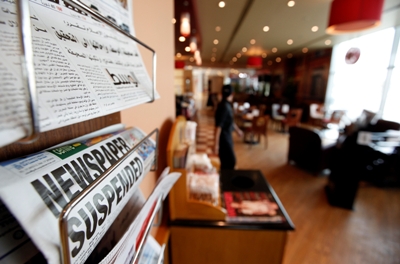New York, April 12, 2011– The Committee to Protect Journalists called on Bahraini authorities to launch an immediate and thorough investigation into the death of a blogger while in state custody. Bahraini authorities, meanwhile, announced that they would file criminal charges against three senior editors at the Gulf kingdom’s premier independent daily, continuing a months-long pattern of violence, harassment, and intimidation against journalists covering widespread civil unrest. CPJ documented other attacks on the press in Libya, Syria, and Yemen.
The blogger, Zakariya Rashid Hassan al-Ashiri, who moderated and wrote for a website that covers news and other developments in his village of al-Dair, died under mysterious circumstances while in government custody on Saturday, regional and international media reported. Security forces arrested al-Ashiri on April 2, according to the same press accounts. He was charged with disseminating false news and inciting hatred, the BBC reported. Although the site is inaccessible inside Bahrain, according to local journalists, CPJ viewed the website and found no basis for the government’s allegations. Government claims that al-Ashiri died from complications of sickle cell anemia were vigorously denied by his family, CPJ research shows.
“The circumstances of Zakariya al-Ashiri’s death raise numerous questions about his treatment,” said Mohamed Abdel Dayem, CPJ’s Middle East and North Africa program coordinator. “The government’s claim that he died from a pre-existing condition–which is disputed by the family–does nothing to answer any of those questions.”
Bahrain’s public prosecutor, Ali al-Buainain, will be filing criminal charges against three former editors at the independent daily Al-Wasat, the official Bahrain News Agency reported on Monday. Editor-in-chief Mansoor al-Jamri, Managing Editor Walid Nouwaihidh, and Local News Director Aqeel Mirza will be charged with “publishing false reports” and “harming the interests of the country,” the news agency said. All three stepped down on April 3 in what al-Jamri described as an effort to save the newspaper. On April 4, another Al-Wasat editor, Ali al-Sharifi, and columnist Rahim al-Kaabi, both Iraqi nationals, were deported from Bahrain.
“If the case against Al-Wasat and its journalists is not a politicized witch-hunt, prosecutors must seriously investigate the paper’s claims that they were duped into publishing false information, which was later used as a pretext for manipulating the country’s premier independent publication,” CPJ’s Abdel Dayem said.
Al-Jamri conceded that the news items called into question by the government had been “printed in error,” but maintained that the newspaper had not deliberately published misleading information, AFP reported. He told Human Rights Watch that an internal investigation revealed that all six false news leads, which described alleged government misconduct, had come from different email accounts, but had all originated from the same IP address. Human Rights Watch added that the false leads “appeared to have been sent also to other Bahraini newspapers, making them appear more authentic, but with small mistakes in the addresses so that, in fact, Al-Wasat was the only recipient.”
Anti-press attacks were reported elsewhere in the region:
The Iranian government-owned Al-Alam, an Arabic language news station, said on April 5 that one of its correspondents in Libya has been in government custody since March 16. Lotfi Ghars, a Canadian national of Tunisian origin, was arrested while entering Libya from Tunisia, according to the same report. Al-Jazeera correspondent Lofti al-Messaoudi, who was released from custody April 3, told Al-Alam that he had heard Ghars’ voice at the Tripoli jail while he was being held.
At least 18 journalists and media workers are missing or in government custody in Libya, CPJ research shows.
In Syria, authorities on Monday arrested Fayiz Sara, a prominent writer and regular contributor to Al-Hayat and As-Safir, among several other Arab newspapers, according to local and international news reports. Sara was taken from his home in Damascus and his whereabouts remained unknown, Agence France-Presse said. The arrest followed a meeting between Sara and Samira al-Mussalma, the recently-dismissed editor-in-chief of the government mouthpiece Tishrin, the London-based pan-Arab daily Al-Sharq al-Awsat reported on Sunday. Al-Mussalma was dismissed from her post over remarks to Al-Jazeera in which she called for an official investigation if security forces had violated an executive order against using live ammunition on protesters, according to Al-Jazeera.
Al-Arabiya correspondent Mohamed Zayd Mastou was detained on April 7. CPJ had previously reported that Mastou, a Syrian national who lived in Norway, had gone to Syria to cover the protests that began on March 15, citing a report by Al-Arabiya. Mastou’s wife, Karen Fausto, has since informed CPJ that he had applied for political asylum in Norway in September 2009. His application was denied in December 2010, and he returned to Syria on February 15. Correcting initial reports, she said her husband had been detained on April 6.
In Yemen on Saturday, authorities arrested Fahd al-Tawil, a reporter for the independent daily Al-Oula, while he was covering anti-government protests in the capital Sana’a, the Yemeni Journalists’ Syndicate said. Al-Tawil was held for two hours, during which he was physically assaulted. His shoulder was dislocated and his face and abdomen were bruised. Also on Saturday, Mohamad al-Shaybani, an Al-Oula distributor, was beaten by thugs while distributing copies of the paper in Sana’a, local journalists told CPJ.
On Saturday, Osama Ghalib, editor of the independent weekly Al-Nass, and reporter Mansur al-Jaradi received anonymous threats, Ghalib told CPJ. He said that an unidentified individual had made separate death threats over the phone to both journalists, also threatening to bomb the paper’s offices. Ghalib told CPJ that the threats followed an article in the weekly’s previous issue that reported on President Saleh’s waning support in his native town of Sanhan, southeast of Sana’a.
